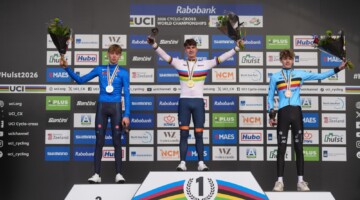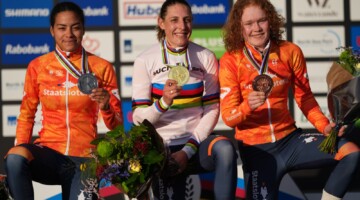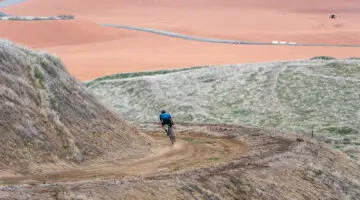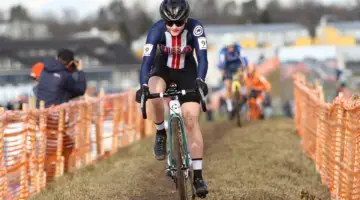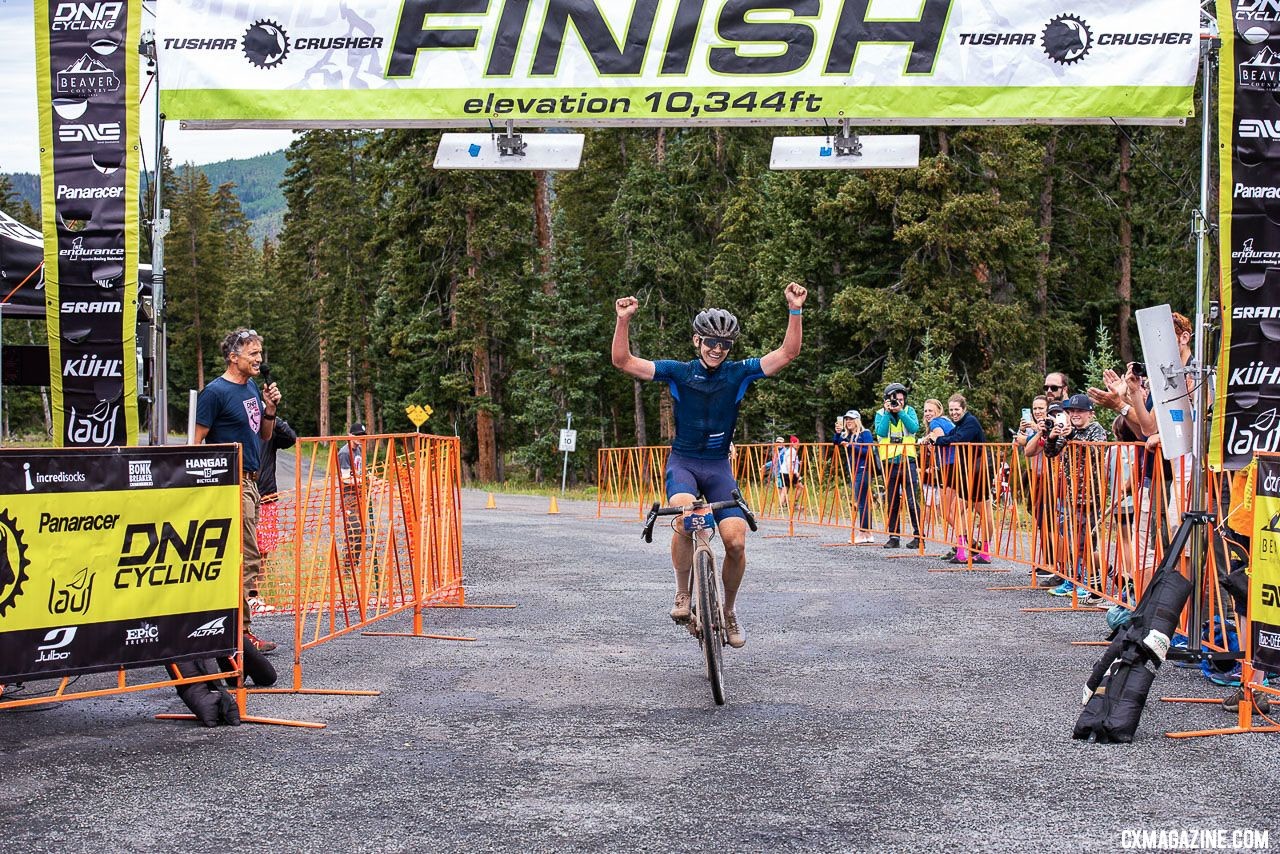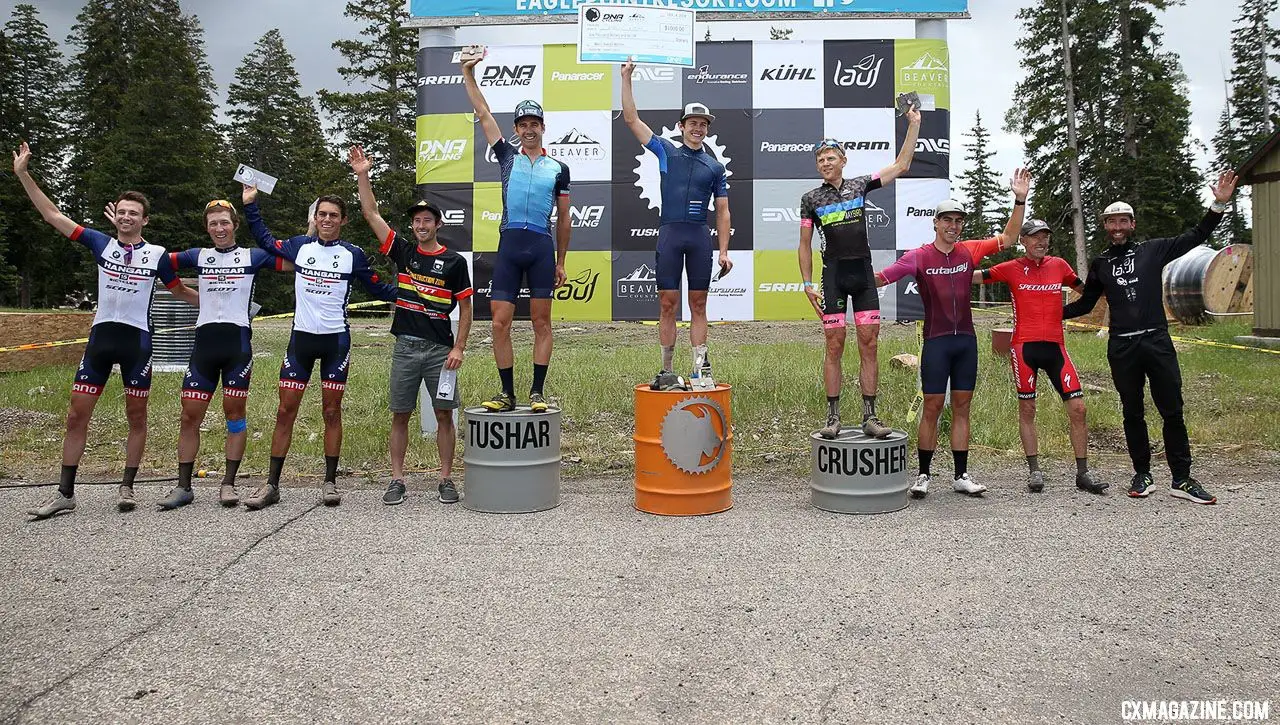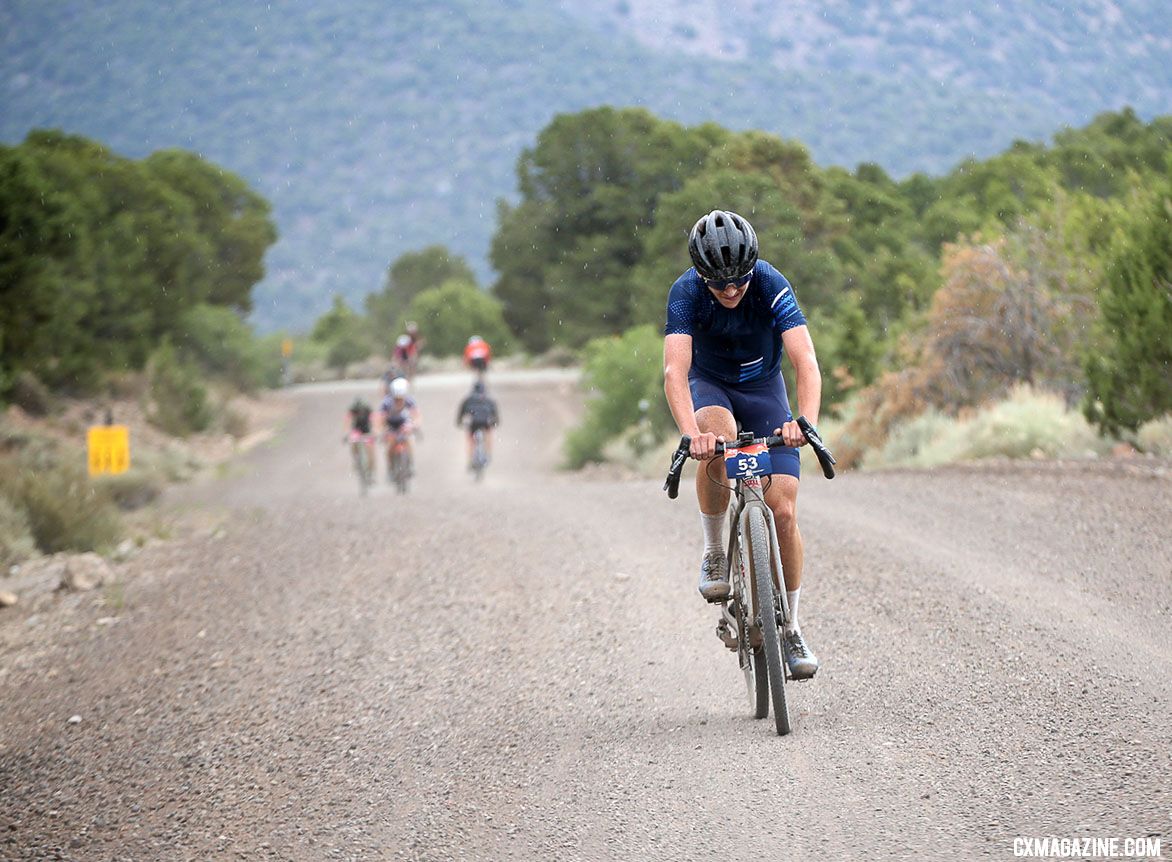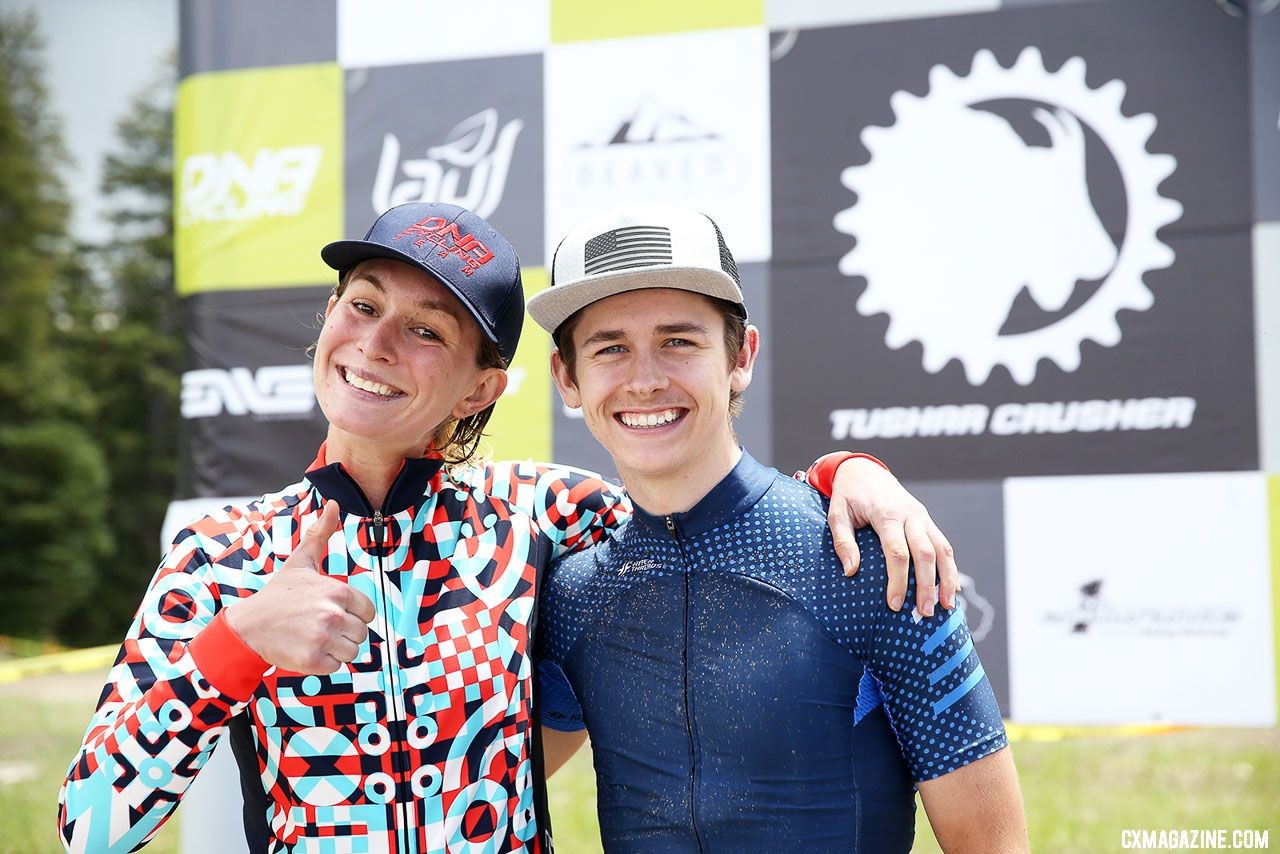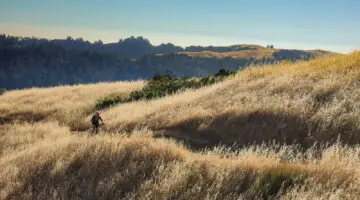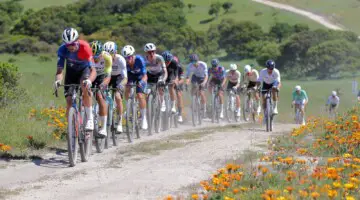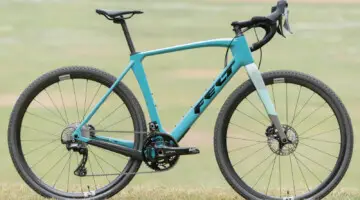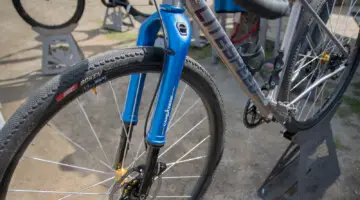Prior to the 2018 Crusher in the Tushar, Utah’s Zach Calton had exactly zero formal gravel racing experience. When Calton crossed the line first to win the 2018 Crusher in the Tushar, he kicked off his gravel career with a perfect record.
The 21-year-old started biking thanks to the National Interscholastic Cycling Association (NICA), and then quickly moved on to racing cross country mountain bikes. He now races for the Spry – Legacy Properties West team and raced in the U23 XCO race at Mountain Bike Nationals a few weeks ago.
The Crusher in the Tushar is known for its “anything goes” approach to bike choice thanks to the two big climbs and steep, switchback descent down the Col ‘d Crush. Like the Women’s winner Lauren De Crescenzo, Calton rode a borrowed bike for the event. He said although it was a gravel bike, his mountain bike experience paid off. For the most part.
“It definitely helped, but to be honest, I nearly crashed on the first two corners in a row,” he said about riding down the Col ‘d Crush descent. “In the first corner, I slid out and just had to pop a foot down. In the second corner, I did the same thing, slid out and had to put a foot down. From there I decided to play it a little safer and just slotted in behind Jamey and Alex. Jamey was ripping pretty good though and he got a 10-ish-second gap, but even with the 2 almost-crashes, I was the 3rd guy out onto the pavement, so the bike handling skills definitely helped.”
Calton stayed in the lead group after the descent and then made his move on the Col ‘d Crush climb. “I’ve heard the race falls apart on the Col ‘d Crush every year, so I anticipated giving it hell on the climb and just playing the hand I was dealt at that point,” Calton said. “I really did not expect to have a gap over the top.”
His gap over Jamey Driscoll gave him a win in his first career gravel race. When he takes the line at his next gravel event—whether it be his Crusher title defense in 2019 or something sooner—he will bring an impressive 1.000 batting average with him.
We chatted with Calton about his win and how his mountain biking skills benefitted him during the race.
Interview with Zach Calton, 2018 Crusher in the Tushar Winner
Cyclocross Magazine: We admittedly don’t know much about you. Sorry! Can you introduce yourself for our readers?
Zach Calton: Yeah! I’m Zach Calton. I am from Ogden, Utah but now live in Salt Lake City and go to school full time at the University of Utah studying business management. I also work at an awesome bike shop in Kaysville called Biker’s Edge.
I primarily race cross country mountain bike with my team Spry – Legacy Properties West. I got my start in cross country and cycling in general through NICA in 2014. From there my friend Connor Barrett introduced me to MJ Turner and the Summit Bike Club, which is a local club that helps introduce young riders to the sport and support racers at higher level racing events like the Pro XCT series, National Champs and some international events. Through four years of racing with them, I got exposed to some cross country racing and have been doing that ever since.
CXM: Did have any gravel experience before racing the Crusher?
ZC: The Crusher was my first, and so far, only formal gravel race. Northern Utah actually doesn’t have a ton of gravel roads, at least not that are convenient to access for me, but we do have one big one called Farmington Canyon. It’s about 15 miles and 5,000 feet of climbing all in one go and you have a really nice view from the top at Francis Peak, so I’ve utilized that road quite a bit for cross country training and then prep for the Crusher!
CXM: What brought you out for the Crusher?
ZC: It’s a super-iconic event for Utah cyclists. We have a ton of races here, but Lotoja, Point to Point and The Crusher are the three that even non-cyclists in Utah are at least somewhat familiar with. It’s definitely been on my to-do list of events for a few years, but it’s so close to Mountain Bike Nationals that I’ve skipped out in years past. This year I felt like I was strong enough to do the race and then recover for Nationals the following week so I decided to send it!
CXM: Did you have a plan going into the race? There are some pretty big names in that field!
ZC: I had an idea of how the race would play out, but I didn’t necessarily have a plan. I knew on a super-great day I could go top 3, but if I had a mediocre day I could also fall out of the top 10.
My plan was to stay with the lead group to the bottom of the Col ‘d Crush and generally just avoid being solo through Circleville so I wouldn’t have to fight the wind too hard. I’ve heard the race falls apart on the Col ‘d Crush every year, so I anticipated giving it hell on the climb and just playing the hand I was dealt at that point. I really did not expect to have a gap over the top.
CXM: What was the key part of the race in helping you win?
ZC: The key was to be patient and to be a part of as large a group as possible through Circleville. I think it would have been easy to get carried away earlier in the race and just be out of gas once the Col ‘d Crush comes. There is no hiding in the bunch when it gets that steep!
I had a really dialed nutrition strategy that kept me from any sort of bonking and cramping later in the race. A big one was also just being a light person and having a light bike helped a lot. That hill is really steep!
CXM: Did your mountain bike experience help on the big descent?
ZC: It definitely helped, but to be honest, I nearly crashed on the first two corners in a row. *laughs* I went to the front before the descent, but the road surface totally changed. Before the big descent, we had perfectly made hero dirt, but on the descent itself, it seemed like it hadn’t rained in weeks and it was like that kitty-litter rock coating on top of a really hard bottom surface. Braking and cornering traction was almost zero.
In the first corner, I slid out and just had to pop a foot down. In the second corner, I did the same thing, slid out and had to put a foot down. From there I decided to play it a little safer and just slotted in behind Jamey and Alex. Jamey was ripping pretty good though and he got a 10-ish-second gap, but even with the 2 almost-crashes, I was the 3rd guy out onto the pavement, so the bike handling skills definitely helped. It was tough to keep track of, but I think 2 or 3 guys missed the lead group of 12 because of the descent.
CXM: What bike did you ride? Any special gravel modifications?
ZC: I don’t own a cyclocross or gravel bike, so I asked my manager and friend Juan from Biker’s Edge if I could borrow his Norco Search XR, which is a thoroughbred gravel bike. I ran it with 700c wheels and a 40t chain ring with a 10-42 cassette. It’s a completely stock build except Juan has Enve M525’s on there, which were money.
So no real modifications, since it’s already gravel ready. It has a dropper post on it too. I used it a couple times because it was there, but I will probably opt for a normal seatpost next time. Even with the dropper, the bike was under 18lbs with pedals and cages.
CXM: What about tires and tire pressure?
ZC: I ran Maxxis Ramblers, 700c x 40mm with EXO casing at 27 psi front and 29 rear. I tried lower pressures and flatted when I was getting the bike ready to race. I thought the tires were perfect!
CXM: How did the setup work for you? Would you change anything if you race next year?
ZC: It worked great! Like I said, I ran a dropper, but really felt no use for it on this particular course. I’m a huge fan of droppers and spend about half my training time on trail bikes with droppers, but just never really felt like it made me faster or gave me more control on the day.
One thing I am a huge fan of is bars with a lot of flare in the drops. I think it adds a ton of control on the descents, and I feel like it puts the brake levers in a better position for controlled braking. I also ran King cages which grip bottles like no other, so I think I was one of very few people to not lose one or both of their bottles on the big descent.
CXM: We see a lot of ‘cross racers do well at gravel. What aspects of mountain bike training gave you an advantage?
ZC: To be honest, I think this race resembles a mountain bike race more than a cyclocross race in terms of physiological demand. I have races with long sustained climbs in them all the time, whereas cyclocross seems to be more punchy. I think ’cross guys do well because they are just generally very fit.
My training isn’t very structured, I usually just go out and try to see what trails I can go up fast on any given day, and I prefer to ride longer hours and fit in the intensity when I can, whereas a lot of people I race against prefer to do shorter hours that are very intense. I think races like the Crusher with long and sustained efforts suit me and the training I enjoy doing really well.
CXM: Do you have plans to do more gravel races in the future?
ZC: Not right now, but I really want to do the Dirty Kanza within the next few years. Unfortunately, it doesn’t look like that will work with the mountain bike racing I have planned for 2019, but I will definitely try to defend the title next year at the Crusher!
CXM: Thanks for your time.
ZC: Yep, thank you.
For more from Utah, see our Crusher in the Tushar archives.



